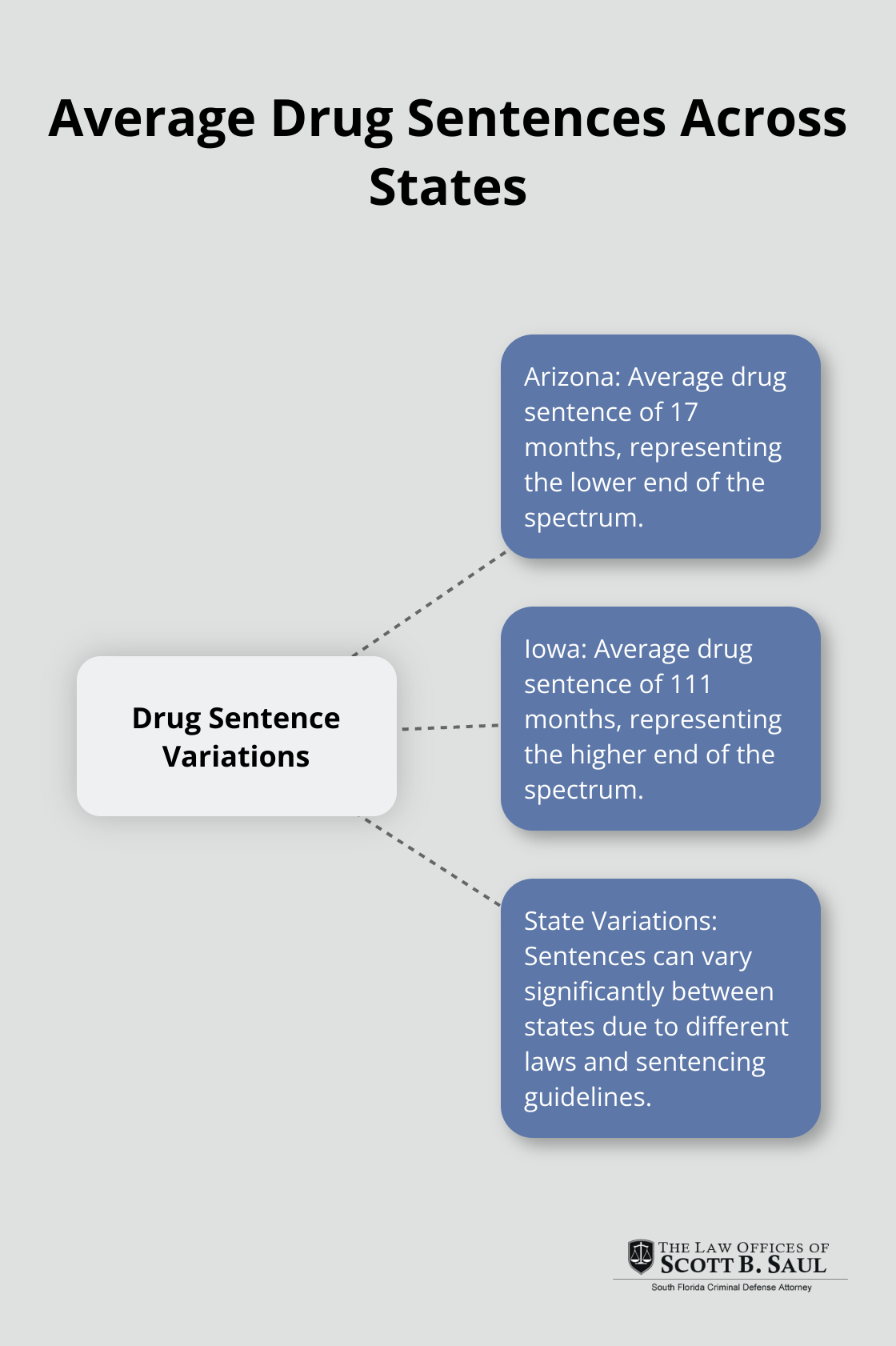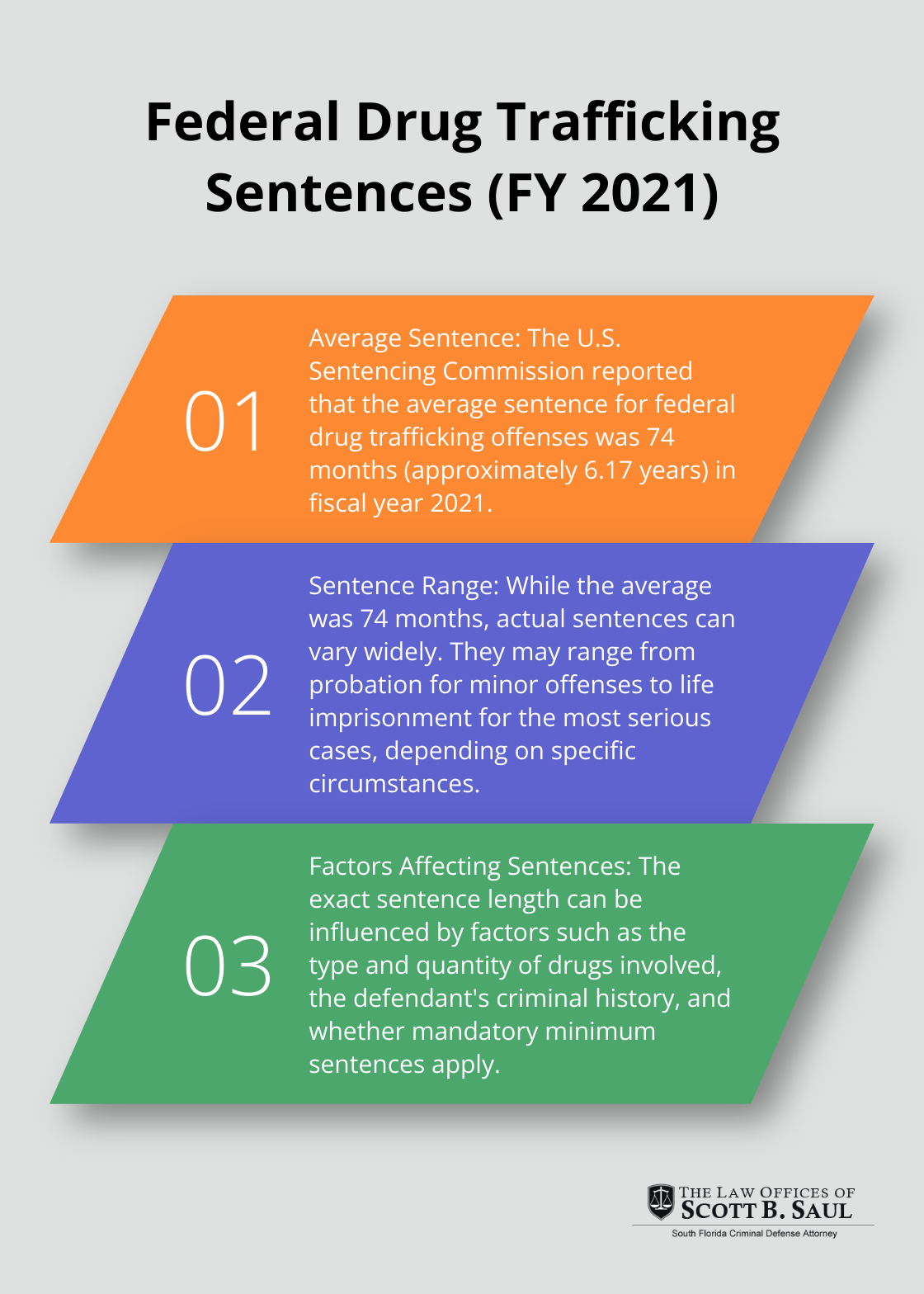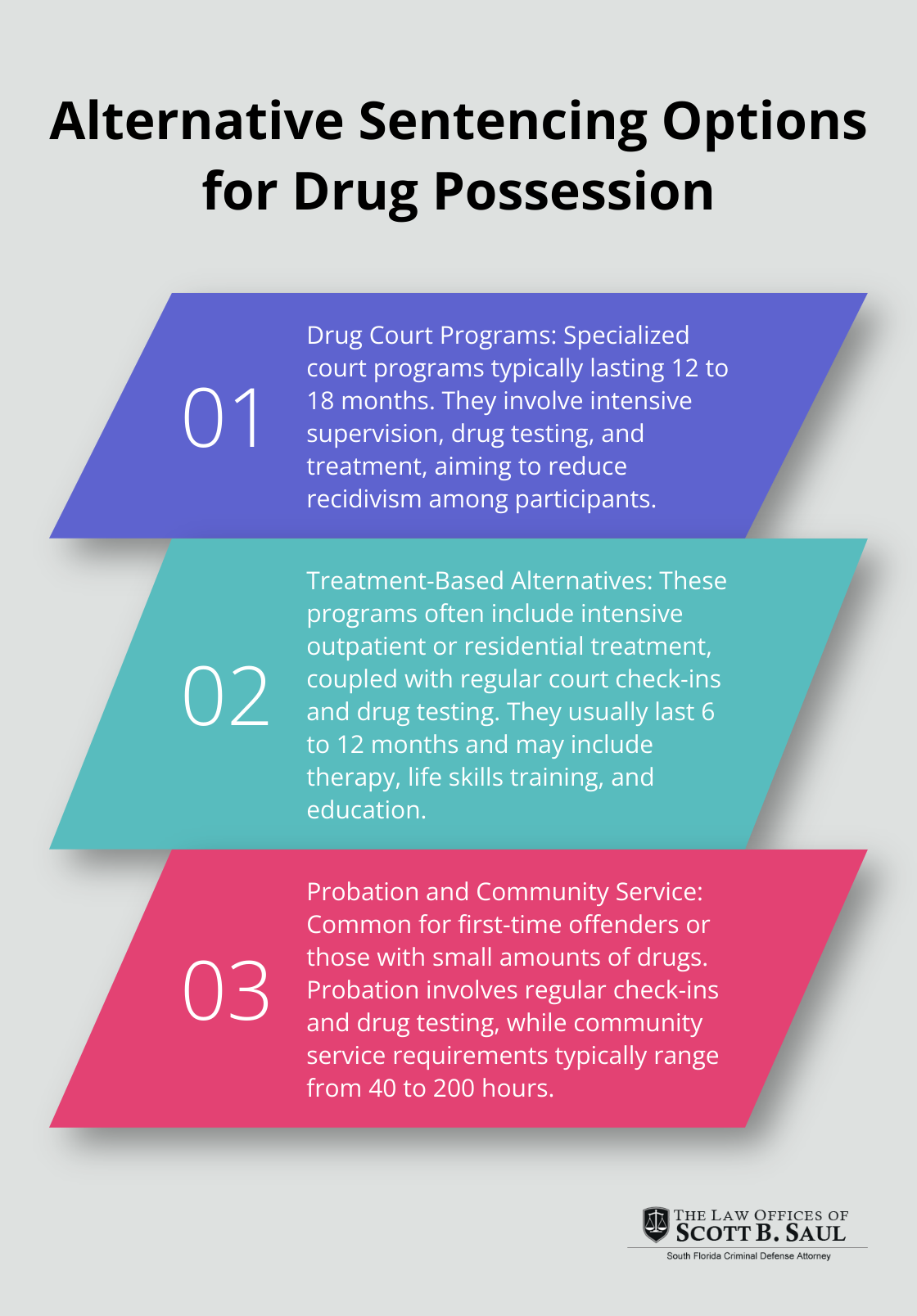How Long Is Jail Time for Drug Possession?
By : saulcrim | Category : Criminal Defense | Comments Off on How Long Is Jail Time for Drug Possession?
30th Jun 2025

Drug possession charges can have serious consequences, including jail time. At Law Offices of Scott B. Saul, we often hear the question: “How long do you go to jail for drug possession?”
The answer isn’t straightforward, as numerous factors influence sentencing. This blog post explores the key elements that determine jail time for drug possession, comparing federal and state charges, and discussing alternative sentencing options.
What Determines Jail Time for Drug Possession?
Drug possession charges can lead to varying jail sentences depending on several key factors. Understanding these elements is essential for anyone facing such charges.
Drug Type and Quantity
The type and amount of drug found in possession significantly impact potential jail time. Schedule I substances (like heroin or LSD) typically carry harsher penalties compared to Schedule IV or V drugs. For instance, possessing 10 grams of cocaine might result in a 5-year sentence in Ohio, while a similar amount of marijuana could lead to much lighter penalties in many states.
Criminal History
A person’s prior record plays a major role in sentencing. First-time offenders often receive lighter sentences or even alternative options like probation. However, repeat offenders face increasingly severe penalties. In some cases, a second drug possession offense could lead to a “career offender” designation, substantially increasing jail time.
Intent to Distribute
Courts distinguish between possession for personal use and possession with intent to distribute. Drug possession involves holding controlled substances for personal use, while drug distribution indicates intent to sell or transfer those substances. Legal consequences for distribution are typically much more severe than those for simple possession.
State-Specific Laws
Sentencing guidelines vary widely between states. For example, possessing any amount of cocaine in Georgia can result in up to 15 years in prison, while some states have decriminalized small amounts of certain drugs. It’s important to understand the specific laws in your jurisdiction. The U.S. Sentencing Commission reports that the average drug sentence can range from 17 months in Arizona to 111 months in Iowa, highlighting these stark differences.

Aggravating Factors
Several factors can increase the severity of a drug possession sentence. These include:
- Possession near schools or other protected areas
- Involvement of minors in the offense
- Possession of firearms during the offense
The presence of any of these factors can significantly extend jail time, even for first-time offenders.
As we move forward, it’s important to consider how federal and state charges differ in drug possession cases, as this can greatly influence the potential jail time a defendant might face.
Federal vs State Drug Charges: Understanding the Differences
Federal Drug Possession Charges
Federal drug charges typically involve larger quantities of drugs, trafficking across state lines, or cases that intersect with other federal crimes. These charges often carry harsher penalties due to federal mandatory minimum sentences. A first-time offender convicted of possessing 500 grams of cocaine at the federal level faces a mandatory minimum sentence of 5 years in prison.
The U.S. Sentencing Commission reports that in fiscal year 2021, the average sentence for drug trafficking offenses was 74 months. However, this average can mislead as sentences can range from probation to life imprisonment depending on the specific circumstances of the case.

State Drug Possession Charges
State laws regarding drug possession vary widely across the United States. Some states have decriminalized possession of small amounts of certain drugs, while others maintain strict penalties. In Florida, possession of 20 grams or less of cannabis is a misdemeanor of the first degree. In contrast, Colorado allows adults to possess up to 2 ounces legally.
State charges often allow for more flexibility in sentencing, with many states offering alternative sentencing options (like drug courts or rehabilitation programs) for first-time offenders. However, repeat offenders or those caught with larger quantities can still face significant jail time.
Impact of Jurisdiction on Your Case
The jurisdiction under which your case falls can significantly impact the potential outcome. Federal cases often have more resources for investigation and prosecution, potentially leading to stronger cases against defendants. However, they also typically involve more serious offenses.
State cases, while potentially carrying lighter sentences, can vary greatly depending on local laws and the discretion of prosecutors and judges. A drug possession charge in a conservative rural county might receive harsher treatment than the same charge in a more liberal urban area.
Navigating the Legal Landscape
The complexities of federal and state drug charges require expert legal guidance. An attorney with experience in both federal and state courts can provide invaluable assistance in navigating these intricate legal landscapes. They can help develop effective defense strategies tailored to the specific jurisdiction and circumstances of each case.
The potential jail time and long-term consequences can vary dramatically based on whether you face federal or state charges. This stark difference underscores the importance of understanding the nuances between these two legal systems. As we move forward, we’ll explore alternative sentencing options that may be available in drug possession cases, offering potential alternatives to traditional incarceration.
Can Alternative Sentencing Reduce Jail Time?
Drug possession charges don’t always result in jail time. Many jurisdictions now offer alternative sentencing options that focus on rehabilitation rather than punishment. These programs can significantly reduce or even eliminate jail time for eligible offenders.
Drug Court Programs
Drug courts have gained popularity across the United States as an effective alternative to incarceration. These specialized court programs typically last 12 to 18 months and involve intensive supervision, drug testing, and treatment. Research has found that drug courts reduced recidivism among program participants compared to comparable probationers.
Participants in drug court programs must attend regular court appearances, undergo frequent drug tests, and complete substance abuse treatment. Successful completion often results in reduced charges or case dismissal. However, failure to comply with program requirements can lead to traditional sentencing.
Treatment-Based Alternatives
Many states now offer treatment-based alternatives to incarceration for drug possession offenses. These programs typically involve intensive outpatient or residential treatment, coupled with regular court check-ins and drug testing. Research has compared the effectiveness and cost-effectiveness of various treatment modalities, including inpatient, residential, outpatient detox/methadone, and outpatient drug-free programs.
Treatment alternatives often last 6 to 12 months and may include individual and group therapy, life skills training, and education programs. Successful completion can lead to reduced charges or case dismissal, while failure may result in traditional sentencing.

Probation and Community Service
For first-time offenders or those charged with possession of small amounts of drugs, probation and community service are common alternatives to jail time. Probation typically involves regular check-ins with a probation officer, drug testing, and compliance with specific conditions set by the court. Community service requirements vary but often range from 40 to 200 hours.
The Bureau of Justice Statistics reports that probation success rates vary widely by state and offense type. However, probation generally offers a more cost-effective alternative to incarceration, with the potential for better long-term outcomes for offenders.
Eligibility for Alternative Sentencing
Alternative sentencing options are not available or appropriate in all cases. Factors such as the type and quantity of drugs involved, prior criminal history, and local laws all play a role in determining eligibility. It’s important to consult with an experienced criminal defense attorney (like those at Law Offices of Scott B. Saul) to explore all available options in your specific case.
Final Thoughts
Drug possession charges can lead to significant jail time, but the exact duration depends on various factors. The type and quantity of drugs, an individual’s prior criminal record, and the intent behind possession all influence sentences. State-specific laws and sentencing guidelines further complicate the issue, with penalties varying widely across jurisdictions.
Federal charges typically carry harsher sentences than state charges, often due to mandatory minimum sentencing requirements. Many states now offer alternative sentencing options that focus on rehabilitation rather than punishment. These alternatives, including drug court programs, treatment-based options, and probation, can reduce or eliminate jail time for eligible offenders.
The complexity of drug possession cases underscores the importance of skilled legal representation. An experienced attorney can navigate the intricacies of both federal and state laws, potentially negotiating reduced charges or alternative sentencing options. At Law Offices of Scott B. Saul, we specialize in criminal defense cases (including those involving tourists and foreign travelers in South Florida). Our background equips us to develop effective defense strategies tailored to each client’s specific situation when addressing the question: “How long do you go to jail for drug possession?”
Archives
- June 2025 (9)
- May 2025 (9)
- April 2025 (8)
- March 2025 (9)
- February 2025 (8)
- January 2025 (9)
- December 2024 (10)
- November 2024 (5)
- July 2024 (2)
- June 2024 (2)
- May 2024 (2)
- April 2024 (2)
- March 2024 (2)
- February 2024 (2)
- January 2024 (2)
- December 2023 (2)
- November 2023 (2)
- October 2023 (2)
- September 2023 (2)
- August 2023 (1)
- July 2023 (2)
- June 2023 (2)
- May 2023 (2)
- April 2023 (2)
- March 2023 (2)
- February 2023 (2)
- January 2023 (2)
- December 2022 (2)
- November 2022 (2)
- October 2022 (2)
- September 2022 (2)
- August 2022 (2)
- July 2022 (2)
- June 2022 (2)
- May 2022 (2)
- April 2022 (2)
- March 2022 (2)
- February 2022 (2)
- January 2022 (2)
- December 2021 (2)
- November 2021 (2)
- October 2021 (2)
- September 2021 (2)
- August 2021 (2)
- July 2021 (2)
- June 2021 (2)
- May 2021 (2)
- April 2021 (2)
- September 2020 (5)
- July 2020 (4)
- June 2020 (4)
- May 2020 (4)
- April 2020 (5)
- March 2020 (4)
- February 2020 (4)
- January 2020 (4)
- December 2019 (1)
- November 2019 (4)
- October 2019 (4)
- September 2019 (4)
- August 2019 (4)
- July 2019 (5)
- June 2019 (4)
- May 2019 (4)
- April 2019 (4)
- March 2019 (4)
- February 2019 (4)
- January 2019 (4)
- December 2018 (4)
- November 2018 (5)
- October 2018 (5)
- September 2018 (4)
- August 2018 (4)
- July 2018 (7)
- June 2018 (4)
- May 2018 (4)
- April 2018 (8)
- March 2018 (4)
- February 2018 (4)
- January 2018 (4)
- November 2017 (4)
- October 2017 (4)
- September 2017 (4)
- August 2017 (7)
- July 2017 (6)
- June 2017 (4)
- May 2017 (4)
- April 2017 (4)
- March 2017 (4)
- February 2017 (7)
- January 2017 (4)
- December 2016 (7)
- November 2016 (4)
- October 2016 (4)
- September 2016 (10)
- August 2016 (4)
- July 2016 (4)
- June 2016 (4)
- May 2016 (4)
- April 2016 (4)
- March 2016 (4)
- February 2016 (7)
- January 2016 (4)
- December 2015 (5)
- November 2015 (4)
- October 2015 (7)
- September 2015 (4)
- August 2015 (4)
- July 2015 (13)
- June 2015 (9)
- May 2015 (8)
- April 2015 (6)
- March 2015 (4)
- February 2015 (4)
- January 2015 (4)
- December 2014 (4)
- November 2014 (4)
- October 2014 (4)
- September 2014 (3)
Categories
- Adjudication (1)
- Bankruptcy (1)
- Burglary Crimes (3)
- calendar call (1)
- Car Accident (1)
- Criminal Defense (331)
- Cyber Crimes (7)
- DNA (1)
- Domestic Violence (9)
- Drug Crimes (5)
- DUI (12)
- Embezzlement (1)
- Environmental Crimes (4)
- Expungement Law (2)
- Federal Sentencing Law (3)
- Firearm (3)
- Forgery (4)
- General (82)
- Healthcare (3)
- Immigration (1)
- Indentity Theft (1)
- Insurance (5)
- judicial sounding (2)
- Juvenile Crimes (4)
- Manslaughter (4)
- Money Laundering (3)
- Organized Crime (1)
- Racketeering (1)
- Reckless Driving (3)
- RICO (3)
- Sealing and Expunging (2)
- Sex Offense (1)
- Shoplifting (1)
- Suspended Driver's License (1)
- Traffic (4)
- Trending Topics (1)
- White-collar Offenses (1)

